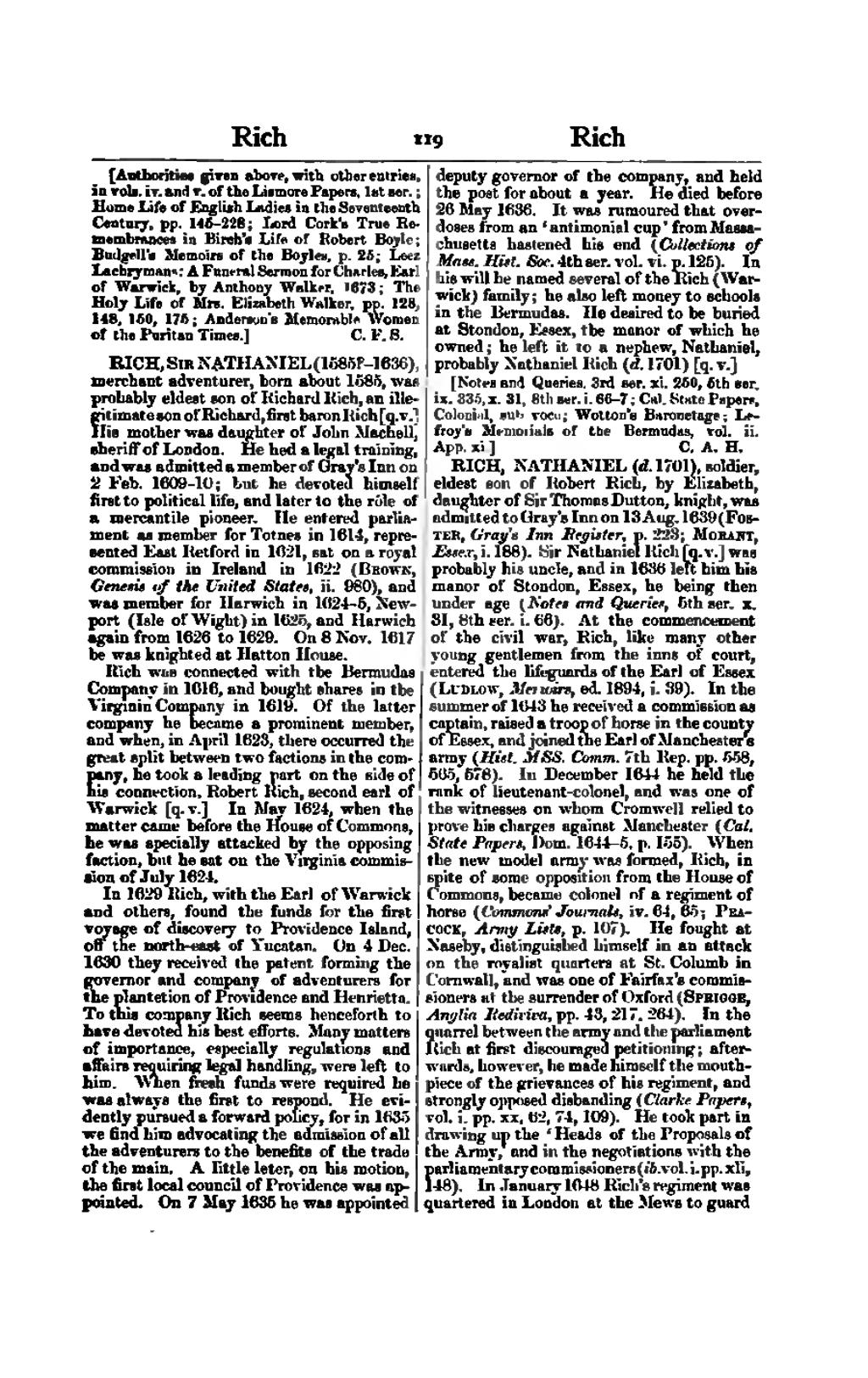[Biographies of Lady Warwick, by C. Fell Smith, 1901, and by Mary E. Palgrave, 1901; Home Life of English Ladies in the Seventeenth Century, pp. 145–228; Lord Cork's True Remembrances in Birch's Life of Robert Boyle; Budgell's Memoirs of the Boyles, p. 25; Leez Lachrymans: A Funeral Sermon for Charles, Earl of Warwick, by Anthony Walker, 1673; The Holy Life of Mrs. Elizabeth Walker, pp. 128, 148, 150, 175; Anderson's Memorable Women of the Puritan Times.]
RICH, Sir NATHANIEL (1585?–1636), merchant adventurer, born about 1585, was probably eldest son of Richard Rich, an illegitimate son of Richard, first baron Rich [q. v.] His mother was daughter of John Machell, sheriff of London. He had a legal training, and was admitted a member of Gray's Inn on 2 Feb. 1609–10; but he devoted himself first to political life, and later to the rôle of a mercantile pioneer. He entered parliament as member for Totnes in 1614, represented East Retford in 1621, sat on a royal commission in Ireland in 1622 (Brown, Genesis of the United States, ii. 980), and was member for Harwich in 1624–5, Newport (Isle of Wight) in 1625, and Harwich again from 1626 to 1629. On 8 Nov. 1617 he was knighted at Hatton House.
Rich was connected with the Bermudas Company in 1616, and bought shares in the Virginia Company in 1619. Of the latter company he became a prominent member, and when, in April 1623, there occurred the great split between two factions in the company, he took a leading part on the side of his connection, Robert Rich, second earl of Warwick [q. v.] In May 1624, when the matter came before the House of Commons, he was specially attacked by the opposing faction, but he sat on the Virginia commission of July 1624.
In 1629 Rich, with the Earl of Warwick and others, found the funds for the first voyage of discovery to Providence Island, off the north-east of Yucatan. On 4 Dec. 1630 they received the patent forming the governor and company of adventurers for the plantation of Providence and Henrietta. To this company Rich seems henceforth to have devoted his best efforts. Many matters of importance, especially regulations and affairs requiring legal handling, were left to him. When fresh funds were required he was always the first to respond. He evidently pursued a forward policy, for in 1635 we find him advocating the admission of all the adventurers to the benefits of the trade of the main. A little later, on his motion, the first local council of Providence was appointed. On 7 May 1635 he was appointed deputy governor of the company, and held the post for about a year. He died before 26 May 1636. It was rumoured that overdoses from an ‘antimonial cup’ from Massachusetts hastened his end (Collections of Mass. Hist. Soc. 4th ser. vol. vi. p. 125). In his will he named several of the Rich (Warwick) family; he also left money to schools in the Bermudas. He desired to be buried at Stondon, Essex, the manor of which he owned; he left it to a nephew, Nathaniel, probably Nathaniel Rich (d. 1701) [q. v.]
[Notes and Queries, 3rd ser. xi. 256, 5th ser. ix. 335, x. 31, 8th ser. i. 66–7; Cal. State Papers, Colonial, sub voce; Wotton's Baronetage; Lefroy's Memorials of the Bermudas, vol. ii. App. xi.]
RICH, NATHANIEL (d. 1701), soldier, eldest son of Robert Rich, by Elizabeth, daughter of Sir Thomas Dutton, knight, was admitted to Gray's Inn on 13 Aug. 1639 (Foster, Gray's Inn Register, p. 223; Morant, Essex, i. 188). Sir Nathaniel Rich [q. v.] was probably his uncle, and in 1636 left him his manor of Stondon, Essex, he being then under age (Notes and Queries, 5th ser. x. 31, 8th ser. i. 66). At the commencement of the civil war, Rich, like many other young gentlemen from the inns of court, entered the lifeguards of the Earl of Essex (Ludlow, Memoirs, ed. 1894, i. 39). In the summer of 1643 he received a commission as captain, raised a troop of horse in the county of Essex, and joined the Earl of Manchester's army (Hist. MSS. Comm. 7th Rep. pp. 558, 565, 578). In December 1644 he held the rank of lieutenant-colonel, and was one of the witnesses on whom Cromwell relied to prove his charges against Manchester (Cal. State Papers, Dom. 1644–5, p. 155). When the new model army was formed, Rich, in spite of some opposition from the House of Commons, became colonel of a regiment of horse (Commons' Journals, iv. 64, 65; Peacock, Army Lists, p. 107). He fought at Naseby, distinguished himself in an attack on the royalist quarters at St. Columb in Cornwall, and was one of Fairfax's commissioners at the surrender of Oxford (Sprigge, Anglia Rediviva, pp. 43, 217, 264). In the quarrel between the army and the parliament Rich at first discouraged petitioning; afterwards, however, he made himself the mouthpiece of the grievances of his regiment, and strongly opposed disbanding (Clarke Papers, vol. i. pp. xx. 62, 74, 109). He took part in drawing up the ‘Heads of the Proposals of the Army,’ and in the negotiations with the parliamentary commissioners (ib. vol. i. pp. xli, 148). In January 1648 Rich's regiment was quartered in London at the Mews to guard
